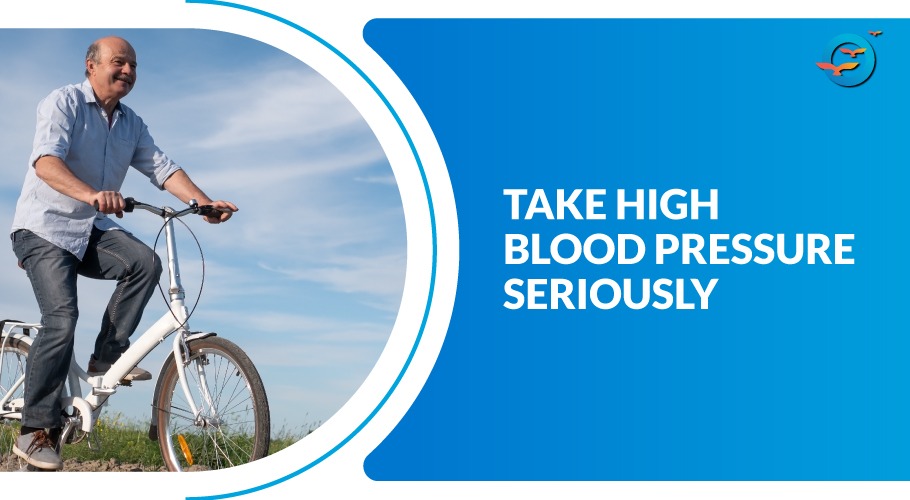Is High Blood Pressure Really a Big Deal?
High blood pressure (HBP), also known as hypertension, is often called the “silent killer.” This is because many people with HBP don’t experience obvious symptoms, yet it quietly damages vital organs over time. Ignoring high blood pressure can lead to serious health complications, making awareness and management essential for long-term health.
What Exactly is High Blood Pressure?
Blood pressure measures the force of blood against the walls of your arteries as your heart pumps it through the body. It’s recorded as two numbers: systolic (pressure when the heart beats) over diastolic (pressure when the heart rests). A normal blood pressure reading is around 120/80 mm Hg.
If your readings consistently stay at 130/80 mm Hg or higher, it indicates high blood pressure. Over time, this extra pressure can weaken and damage your blood vessels and organs, increasing the risk of heart disease, stroke, kidney problems, and other serious conditions.
Why High Blood Pressure Shouldn’t Be Ignored
One of the reasons HBP is dangerous is that it rarely shows early warning signs. You may feel perfectly fine while your arteries are under strain. Despite the lack of symptoms, the consequences can be severe:
1. Heart Disease
High blood pressure causes narrowing of the arteries, making it harder for blood to flow. This increases the risk of heart attacks, heart failure, and other cardiovascular problems. Over time, your heart works harder to pump blood, which can weaken it.
2. Stroke
Hypertension can damage blood vessels in the brain, increasing the likelihood of a stroke. Both ischemic (caused by blocked arteries) and hemorrhagic (caused by bleeding) strokes are linked to uncontrolled high blood pressure.
3. Kidney Damage
The kidneys filter waste from the blood, and high BP puts stress on the delicate blood vessels within them. This can reduce kidney function and, in severe cases, lead to kidney failure.
4. Vision Problems
High blood pressure can affect the tiny blood vessels in your eyes, potentially causing retinopathy, vision impairment, or even blindness if left untreated.
5. Cognitive Decline
Long-term high blood pressure may also affect brain health. Studies suggest that HBP can increase the risk of dementia and memory problems, likely due to reduced blood flow to brain tissues.
How to Manage High Blood Pressure
The good news is that high blood pressure is manageable with proper lifestyle choices and medical care. Here’s how you can take control:
Lifestyle Changes
- Healthy Diet: Increase your intake of fruits, vegetables, whole grains, and lean proteins. Reduce salt and processed foods, which contribute to higher blood pressure.
- Physical Activity: Regular exercise strengthens your heart and helps maintain a healthy weight. Aim for at least 150 minutes of moderate activity per week.
- Weight Management: Even a small reduction in weight can significantly lower blood pressure.
- Limit Alcohol and Quit Smoking: Both habits increase blood pressure and harm cardiovascular health.
- Stress Management: Practice relaxation techniques such as yoga, meditation, deep breathing, or mindfulness to reduce stress-induced spikes in blood pressure.
- Adequate Sleep: Poor sleep quality or insufficient sleep can contribute to HBP, so aim for 7–9 hours of restorative sleep per night.
Medical Treatment
Sometimes lifestyle changes alone are not enough. Doctors may prescribe medications to help control blood pressure. These can include:
- Diuretics
- ACE inhibitors
- Beta-blockers
- Calcium channel blockers
Regular monitoring and checkups are essential to ensure that your blood pressure stays within a healthy range and to prevent complications.
Key Takeaways
High blood pressure is more than just a number—it’s a serious health risk that affects the heart, brain, kidneys, and eyes. The silent nature of HBP makes it even more dangerous, as damage can occur long before symptoms appear.
However, the good news is that with awareness, lifestyle changes, and medical support, high blood pressure can be managed effectively. Small, consistent steps today—like eating healthier, staying active, managing stress, and following your doctor’s advice—can protect your heart and overall health for the future.
Remember: Managing high blood pressure is an ongoing commitment, but it’s one that pays off with a longer, healthier life. Don’t wait for symptoms—take control now.
Read more- https://www.freedomfromdiabetes.org/blog/post/is-high-blood-pressure-really-a-big-deal/3594



